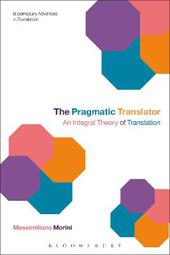
|
The Pragmatic Translator: An Integral Theory of Translation
Hardback
Main Details
| Title |
The Pragmatic Translator: An Integral Theory of Translation
|
| Authors and Contributors |
By (author) Dr Massimiliano Morini
|
| Series | Bloomsbury Advances in Translation |
|---|
| Physical Properties |
| Format:Hardback | | Pages:240 | | Dimensions(mm): Height 234,Width 156 |
|
| ISBN/Barcode |
9781441151308
|
| Classifications | Dewey:418.02 418.02 |
|---|
| Audience | | Tertiary Education (US: College) | |
|---|
|
Publishing Details |
| Publisher |
Bloomsbury Publishing Plc
|
| Imprint |
Bloomsbury Academic USA
|
| Publication Date |
20 December 2012 |
| Publication Country |
United States
|
Description
This book is concerned with translation theory. It proposes an all-round view of translation in the terms of modern pragmatics, as articulated in three pragmatic functions (performative, interpersonal and locative) which describe how translated texts function in the world, involve readers and are rooted in their spatio-temporal contexts. It presents a full and up to date view of translation that takes into account thirty years of research in the field of Descriptive Translation Studies. Unlike DTS, the theory provides an account of products and processes. This publication exhibits the need for and usefulness of such a theory, and will be essential reading for scholars involved in translation and interpreting studies.
Author Biography
Massimiliano Morini is Associate Professor of English Linguistics and Translation at the University of Udine, Italy.
Reviews[Morini] explains difficult theoretical issues in extremely clear and lucid language, providing plenty of relevant microlinguistic examples in Italian and English ... What makes [his] book stand out from previous research is the fact that it aims to formulate a general pragmatic theory of translation, and this goal was certainly achieved successfully ... Morini's pragmatic theory may truly be called 'integral' as it aspires to reconcile existing theories instead of trying to disprove or supplant them, which is very welcome. -- Elena Gheorghita, State University of Moldova * Linguist *
|